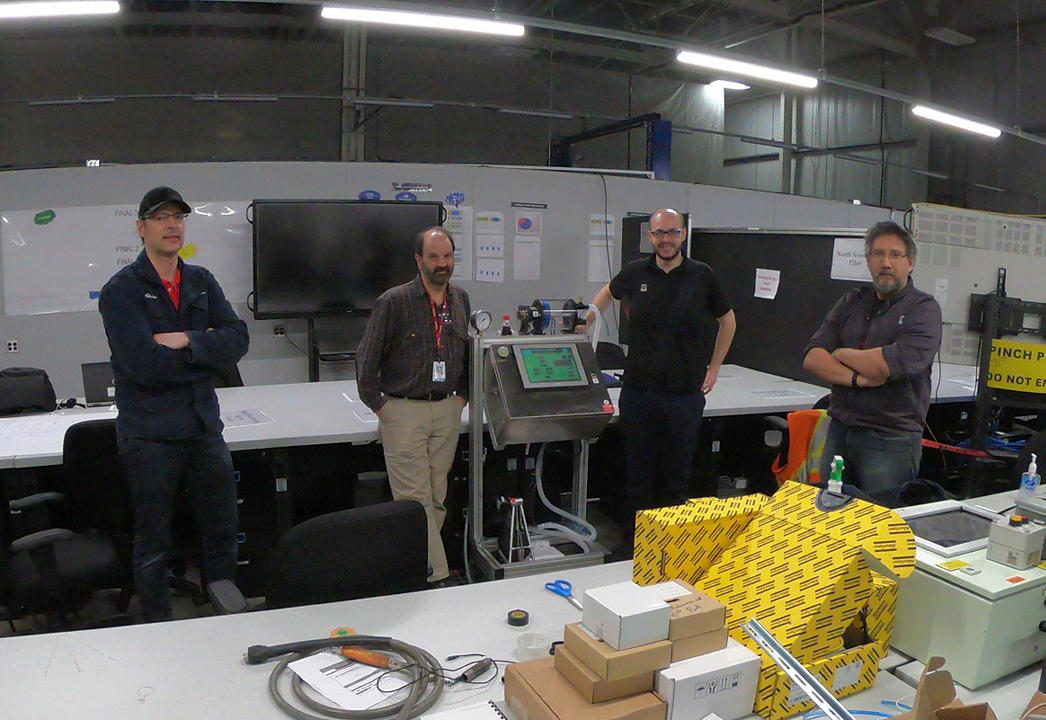LANGUAGES

From left to right: Chris Loates, Daniel Adam, Moe Bdeir and Leon Drasovean.
Toronto, May 6, 2020 – A team including four engineers from Toyota Motor Manufacturing Canada (TMMC) and Fanshawe College finished in the top nine of an international competition to design a low-cost, easy-to-use medical ventilator to help patients around the world who have been affected by COVID-19.
The Code Life Ventilator Challenge design incorporated common parts such as sensors and molded bearings that normally go under the hoods of Toyota and Lexus vehicles with components manufactured using the company’s in-house 3D printers. The team of six people beat out more than 1,000 entries from 94 countries.
“Our team at Toyota couldn’t be prouder. This challenge gave us a new sense of purpose during these times and also taught us that, as complex as a project might seem at the beginning, once you break down the requirements, there are always solutions to the most difficult problems,” said Leon Drasovean, an Engineering Manager at TMMC. “A lot of the credit also goes to our partners at Fanshawe College’s Respiratory Therapy program. We’ve been working closely and seamlessly together for the past several weeks to design a ventilator prototype that would eventually help those in need during this pandemic.”
The Agorize online innovation platform hosted the challenge in collaboration with the Research Institute at the McGill University Health Centre and the Montreal General Hospital Foundation. Its goal was to develop a handful of open-source ventilator designs that will allow any manufacturer to build the much-needed medical devices.
Drasovean said his wife Yvonne learned of the challenge through her role as a Professor of Respiratory Therapy at Fanshawe. The team was formed on March 20 and had just over a week to learn all the details of ventilator design – including patient triggered timing, lung compliance, proper pressures, and safety systems.
“This was all new to us and we had to work very quickly,” Drasovean noted. “Everyone on the team brought a different skillset to the project, so we were able to agree on the best idea and then create our prototype.”
The team documented its design and submitted it by the March 31 deadline.
Working in automotive manufacturing has taught the TMMC team members how to tackle challenges.
“At Toyota, we often face new challenges – it’s something we do every day when building vehicles,” said Chris Loates, a member of the team and a Project Engineering Analyst at TMMC. “When something doesn’t go as planned in our manufacturing facilities, we have to quickly regroup and fix it. We brought that training and approach to this design competition.”
As well as Drasovean and Loates, the team included two other TMMC employees - Engineering Analyst Moe Bdeir and Mechanical Designer Daniel Adam – as well as Drasovean’s wife Yvonne and Professor David Wall, both from the Respiratory Therapy Program at Fanshawe College. The team initially collaborated virtually - from their homes - to research the problem and brainstorm solutions. Once they had a plan, they worked at TMMC – while observing the company’s strict new health and safety protocols – to build their prototype.
“Working together with the engineers at Toyota has been an incredible experience. Their forward thinking and ability to adapt quickly is remarkable. We are extremely proud to have been a part of a competition that brought people together, giving of their time and knowledge to help people around the world,” said Professors Yvonne Drasovean and David Wall. “We are extremely proud to have been a part of a competition that brought people together, giving of their time and knowledge to help people around the world.”
The Code Life Challenge worked with the shortlisted teams to ensure compliance, testing, materials and engineering all meet the required standards during the entire competition.
In typical Toyota fashion, the team continuously improved upon its prototype, optimizing it for manufacturing and streamlining it for use by medical professionals looking after COVID-19 patients.
For team member Moe Bdeir, working on this project was a great chance to do something meaningful during the pandemic.
“Toyota’s culture embraces social responsibility,” he said. “Any opportunity we’re given to give back to the community, we jump in.”
Every effort has been made to ensure the product specifications, equipment, and content on this site are accurate based on information available at time of publishing. In some cases, certain changes in standard equipment or options may occur, which may not be reflected online. Toyota Canada reserves the rights to make these changes without notice or obligation.